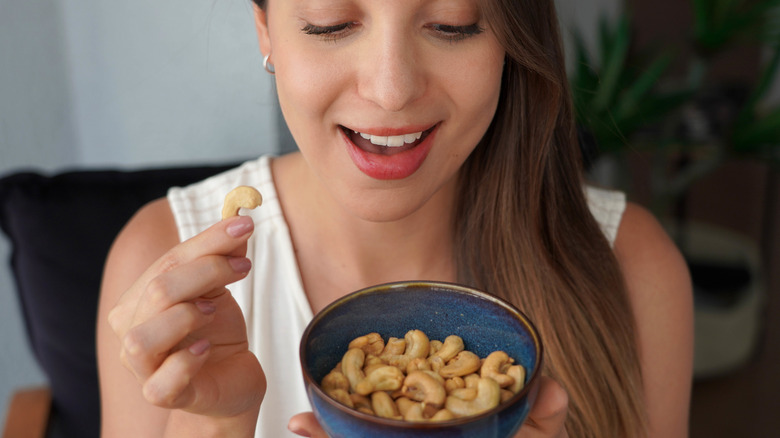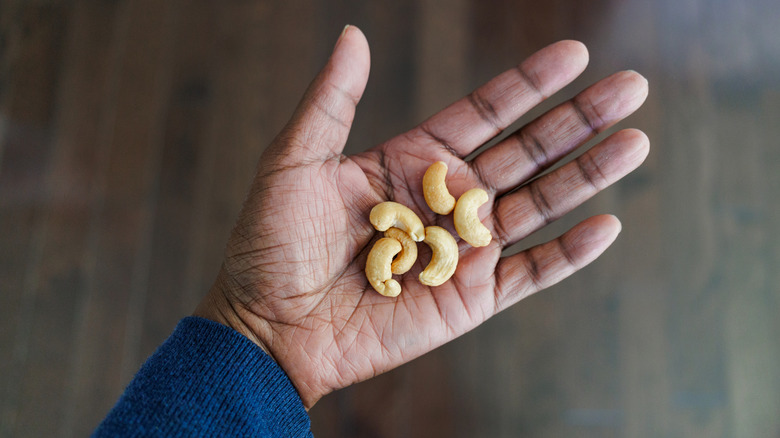When You Eat Cashews Every Day, This Is What Happens To Your Blood Sugar
Are you "glucose curious," wondering how different foods affect your blood sugar? Most people know that highly processed foods, especially those loaded with added sugar, can cause a spike in blood sugar. But things get a bit more complicated when you start mixing foods together. You might avoid white rice because it can raise your blood sugar, but if you pair it with protein, fiber, and healthy fats, you can actually blunt that spike, according to a 2019 study in Nutrition Research and Practice.
(Here are some signs that your blood sugar is spiking.)
That's where cashews come in. An ounce of raw cashews gives you about a gram of fiber, 5 grams of protein, and over 12 grams of fat. Sure, they also have around 9 grams of carbs and a little sugar, but the combo of fiber, protein, and fat helps lower their glycemic index (GI) to just 22 (per the University of Sydney). That means adding cashews to typically high-GI foods could help smooth out your blood sugar response to your meal.
Cashews and nuts may help control blood sugar
People with diabetes may use medication to manage their blood sugar, but diet also plays a big role. That often means swapping out high-glycemic (high GI) foods for lower-GI options like cashews (here are some other foods that can reduce your blood sugar). In a 2019 study in the International Journal of Endocrinology and Metabolism, people with type 2 diabetes replaced 10% of their daily calories with cashews for eight weeks. Compared to those who stuck with their usual diets, the cashew group saw a drop in their insulin levels.
(Read why eating cashews can support your brain health.)
While cashews might seem high in fat, they only have about 2 grams of saturated fat per ounce. Most of their fat is the heart-healthy monounsaturated kind, which may also help regulate blood sugar in people who are insulin resistant. A 2007 study in the Journal of the American College of Nutrition had participants with insulin resistance rotate through three different diets: one high in saturated fat, one rich in monounsaturated fat, and one high in carbs. When they followed the monounsaturated fat-rich diet, their blood sugar was lower, their insulin sensitivity improved, and they had a bigger boost in the hormone GLP-1 after meals. GLP-1 not only helps lower blood sugar but also helps you feel full.
Nutrients and other factors that affect your blood sugar
While fat, protein, and fiber can help slow down your blood sugar response, people with diabetes also need to watch for certain nutrient deficiencies. These can affect not just glucose control but also the risk of mental health issues. According to a 2023 article in Nutrients, omega-3 fatty acids can improve insulin sensitivity, lower fasting blood sugar, and boost mental well-being. Vitamins B, D, and E help lower inflammation, support healthy blood sugar levels, and benefit brain health. And don't forget minerals. Chromium, magnesium, zinc, and iron all play key roles in managing blood sugar and mood. Cashews happen to be a good source of several of these minerals.
But blood sugar isn't only influenced by what you eat. According to the Centers for Disease Control and Prevention, pain from a sunburn can be stressful enough to raise your blood sugar. Dehydration can also spike your levels because it makes your blood more concentrated. And while you might blame sugar in your coffee for a blood sugar spike, for some people, it's actually the caffeine that has an effect.
You'll also want to get enough sleep to keep your blood sugar under control. When you don't get enough rest, your body doesn't use insulin as efficiently. And skipping breakfast? That can lead to higher blood sugar after your later meals and make it harder to manage your levels throughout the day.


